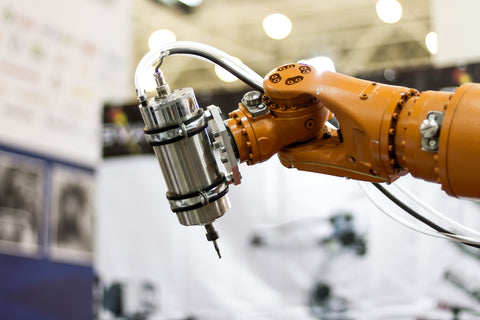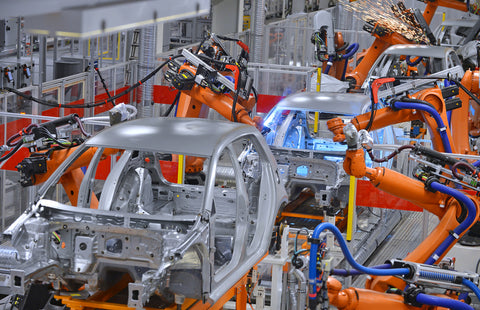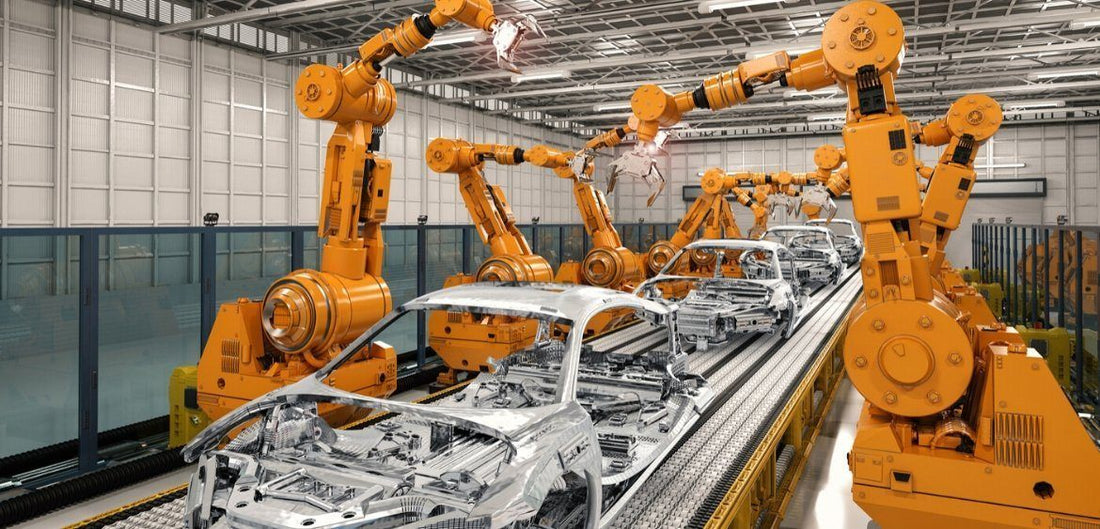Precise linear motion is not only a crucial part of automotive factory automation, but it is also very beneficial. At Progressive Automations we produce high-force electromechanical actuators that can be used in a variety of applications. Our linear actuators are internally lubricated and do not require fluids or maintenance, allowing for extended lifespans as compared to hydraulic or pneumatic systems. Automotive manufacturers are quickly moving towards automated factories due to increased efficiencies, low operating costs, and high precision and repeatability.
Automotive Linear Actuators
Linear actuators can be used for a variety of applications for automotive factory automation, such as robotic weld guns, boring and honing devices, and in assembly/fastening lines. Below, we discuss applications of actuators in automotive factories.
Robotic Weld Guns
In today’s technology-driven world, robots are playing an integral role in manufacturing with many of those being welding robots used for automation in automotive manufacturing. Automated welding systems offer many advantages, including improved weld quality, increased efficiency, and decreased labor costs. Weld quality consists of two main factors, namely, integrity and repeatability. The use of actuators and the ability to program them for a custom task allows welding to be easily repeatable.
Boring and Honing

Boring and honing is the process of achieving straight holes and a nice surface finish. Linear actuators provide precise velocity and distance control. Large forces are needed in boring and honing applications and our high-force actuators can provide these forces along with the precision needed.
Boring and honing are commonly used in automotive manufacturing on the engine cylinders, which affects the engine displacement. Engine displacement refers to the swept volume of all pistons inside the cylinders of an engine. Displacements impact how much fuel a cylinder draws in to create power. By using automotive actuators to automate this process, it allows for higher precision, which is essential on a part of your vehicle that contains a highly flammable substance.
Assembly/Fastening

Tasks like screw/bolt driving, windshield installation, and wheel mounting are all examples of robotic automation in automotive manufacturing plants. High-force actuators are essential in the assembly and fastening of automotive components. Our high-force actuators can be customized to ensure that the assembly, including clenching, piercing, and riveting is done properly and precisely in a repeatable fashion.
Main Benefits of Automotive Actuators
Linear actuators provide many benefits in the automotive industry and the possibilities are endless. Compared to other competing technologies, the benefits of our actuators can be summed up into three main points.
- Lifecycle Performance
All our electromechanical automotive actuators are highly reliable and durable and built to withstand any potentially harmful elements they may be exposed to. Alternative units, such as pneumatic and hydraulic devices, include hoses, filters, valves, pumps and many other things within a network that all decrease their reliability.
- Consistency
Our actuators are designed to be maintenance-free, allowing for more consistent performance. Being electric powered, the actuators receive instant power, meaning no start-up time. You do not need to wait for our units to “warm-up” as opposed to technology that uses other means of power. This allows for consistent performance across the production cycle.
- Energy Savings
A 2011 case study at the University of Kassel in Germany compared the performance of electromechanical actuators with comparably sized hydraulic and pneumatic alternatives. It was found that savings up to 90% were possible when using electromechanical actuators versus those that are fluid powered. Although this is an old study, automotive linear actuators have since improved further due to intensive research and development.
Final Words
Automotive factory automation has become more efficient over the years due to the use of electromechanical linear actuators. Whether the application is for welding, fastening, assembly, or any other tasks, linear actuators will always prove to be more energy-efficient and durable, making them highly desirable in automation in automotive manufacturing. The applications of actuators in automotive plants are endless and each unit we offer has unique capabilities ensuring we will always have a unit for whatever application you may have in mind.




